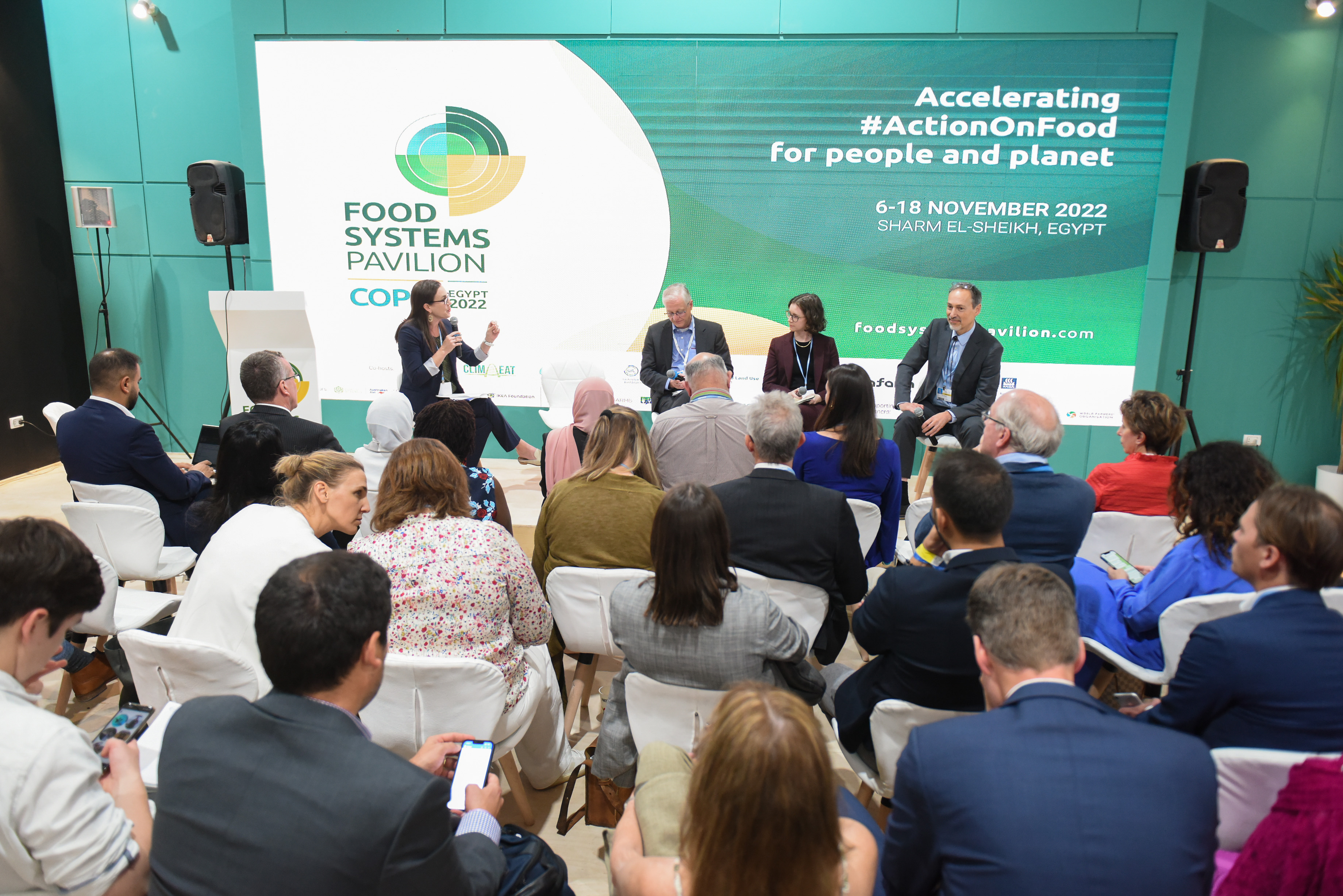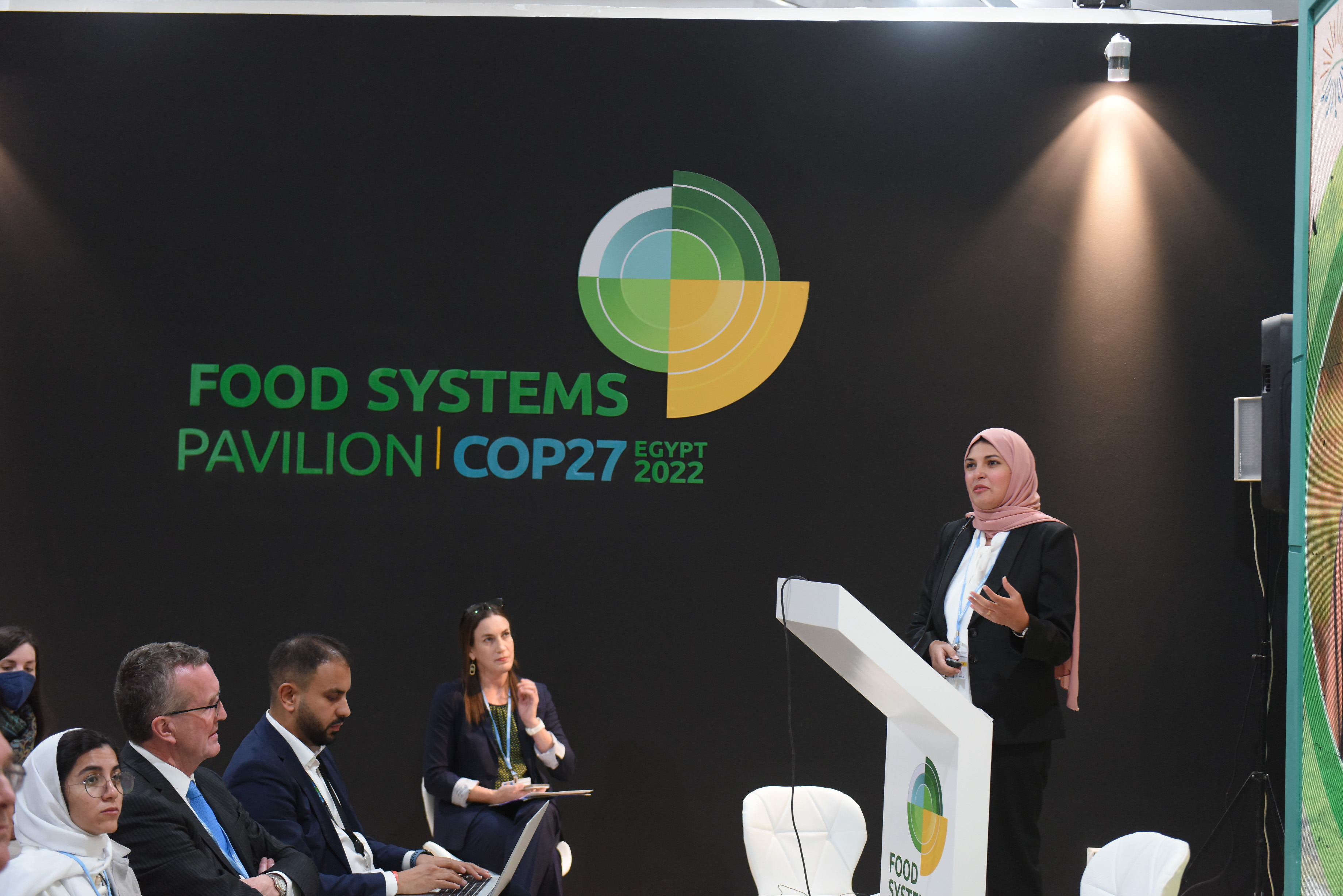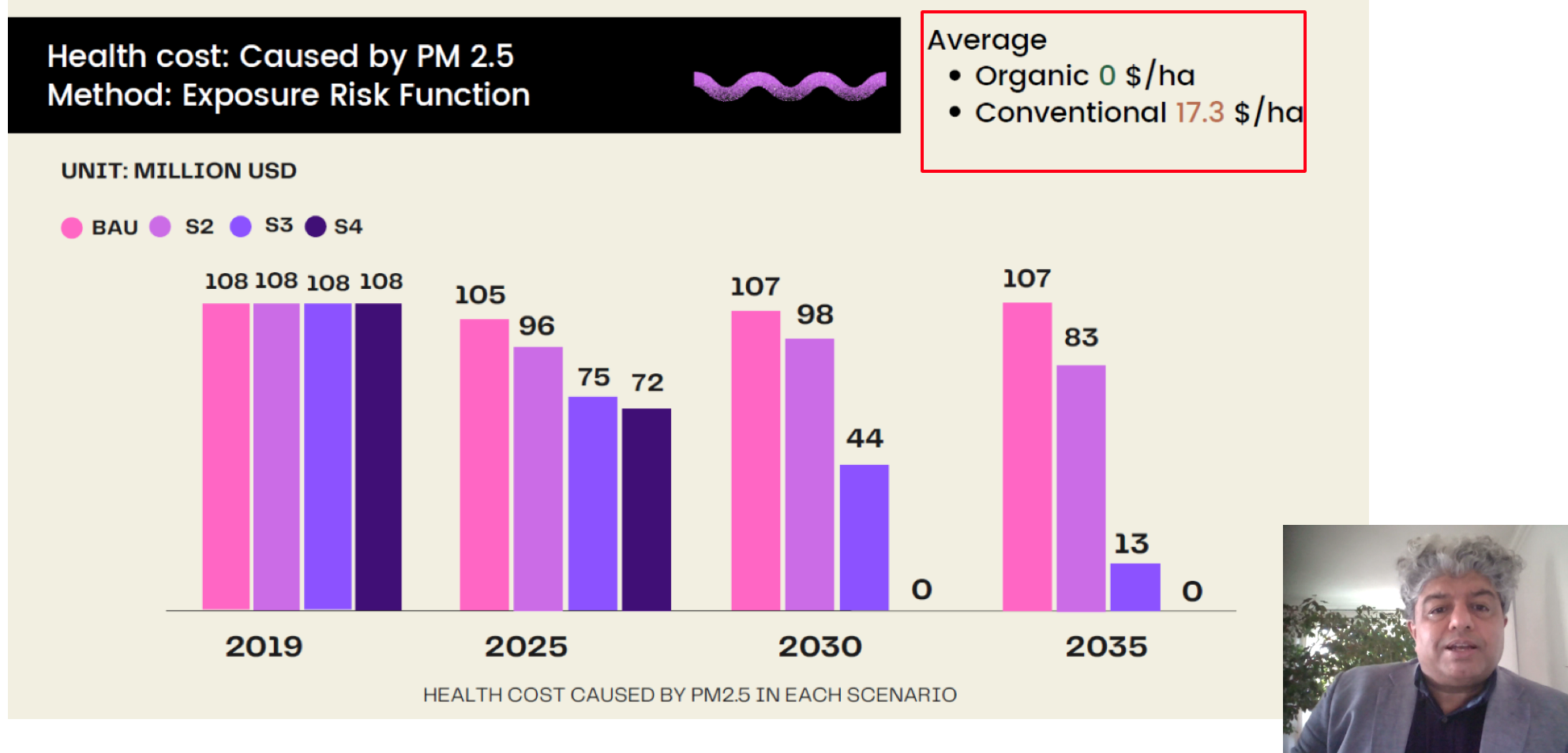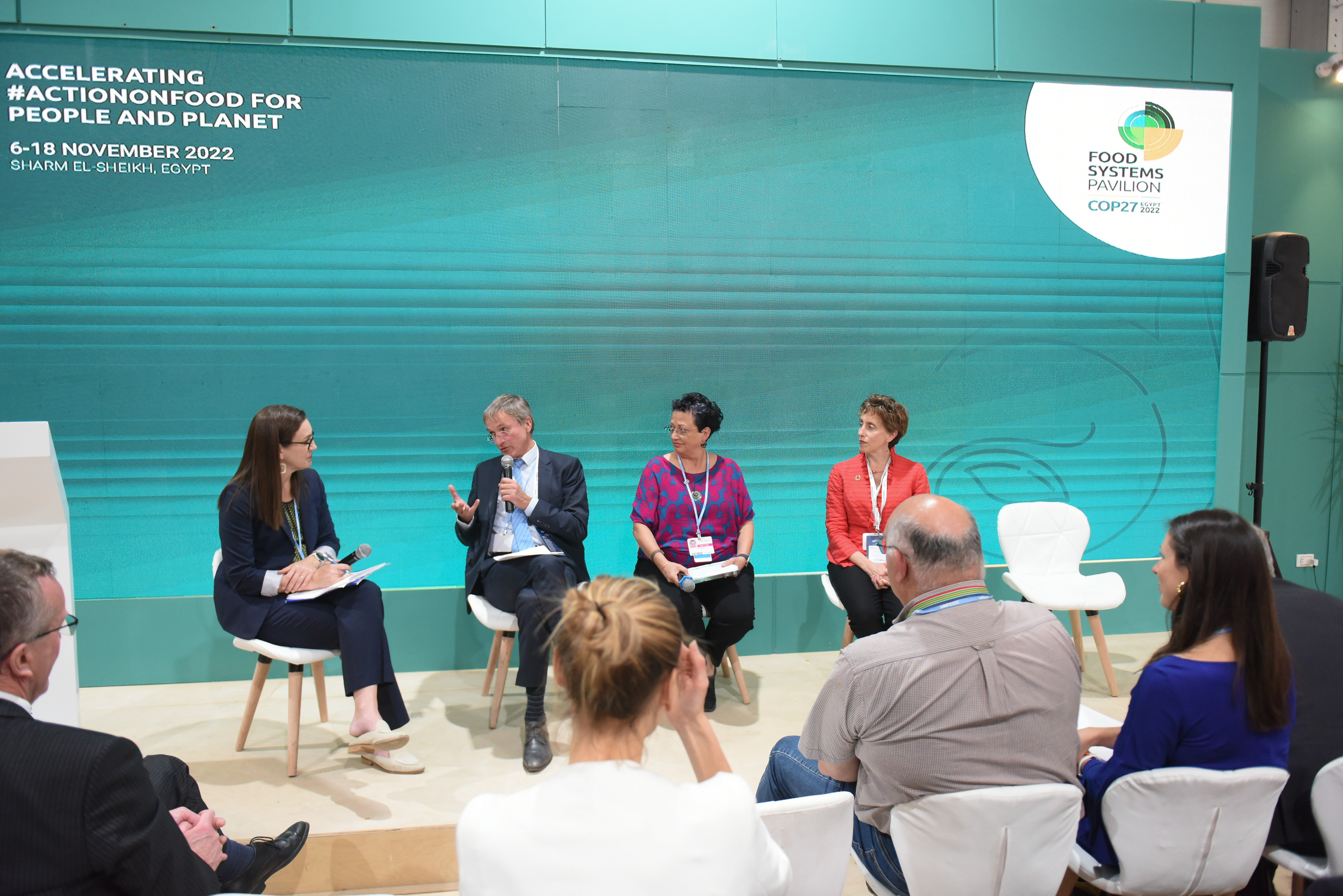Can transforming the way we produce, process, and consume food offer meaningful and lasting solutions to climate change and other global crises? Can reducing the hidden costs from these activities that together comprise our “food systems” actually create positive outcomes for people and nature?
At this year’s UN Climate Change Conference in Sharm El-Sheikh, Egypt, informally known as COP27, the headline-grabbing debates between country negotiators largely centered on two issues: the language committing countries to draw down emissions from fossil fuels, and establishment of a mechanism to compensate vulnerable countries and their citizens for the disproportionate “loss and damage” they incur from current and future warming.
But the topic of food and agriculture’s contribution to, and role in solving, the climate crisis was the surprising third focal point of COP27 discussions. For months preceding the event, a diverse array of advocates rallied to elevate the critical role of food system transformation in providing a roadmap to meaningful, lasting, and equitable solutions to climate change and other global challenges, including food insecurity and diet-related diseases. Is it possible that a significant solution to the climate crisis is right there at the end of our forks?
Food Systems as a Critical Lever for Change
At the last year’s landmark UN Food Systems Summit, people from nearly every country and sector participated in months of dialogues and discussions to develop a clear understanding of the interlocking and often hidden impacts to people and nature stemming from the prevailing way we produce, process, and consume food. This system emerged in the middle of the 20th century through a series of policy and economic drivers aiming to end hunger by increasing agricultural productivity. Yet more than 50 years on, the unintended consequences of this narrow focus on productivity are all around us, notably:
- Industrial food systems account for one-third of global greenhouse gas emissions.
- They are responsible for the explosion of obesity and diet-related disease across the globe, even as food insecurity continues to afflict vulnerable people.
- They are responsible for biodiversity loss, and air and water pollution.
- And they fail to pay farmers and food system workers a living wage
The Food and Land Use Coalition estimates these hidden food system costs to be 12 trillion USD per year in damage. But despite our having recognised these hidden or “externalised” costs for decades, the implications have become starker in recent years as the triple threats of climate change, Covid-19, and conflicts have caused massive disruption to the food supply, caused prices to spike, and increased energy and fertiliser input costs. These converging global crises have made clear the need for urgent action.
The curtain has been pulled back, revealing that the price of these hidden costs is too expensive for society to keep paying.
The True Cost and Value of Food Systems
At a COP27 side event organised by the True Value of Food Initiative, representatives from government, business, civil society, philanthropy, and finance called on global leaders to join them in demanding a full accounting of the true costs and unrealized benefits of food systems, and to invest in practices that maximize food systems’ potential to solve climate change and other longstanding global challenges. Speakers highlighted case studies from initiatives using True Cost Accounting (TCA), an innovative approach to transform food systems into drivers of positive outcomes for people and nature.
True Cost Accounting expands our thinking beyond narrow measures of food system success, like crop yield, by integrating awareness of the system’s true costs and benefits. TCA offers policymakers a unique, transparent lens that enables them to clearly see how food policy decisions in one area can have far-reaching, and often invisible consequences that impact our land and water, public health, and the economic wellbeing of our communities.
Speakers at the True Value of Food event made clear that nowhere is this need for a holistic approach more needed than at the intersection of climate and food systems.
The net effect of the current approach to food and agriculture has been, according to Rockefeller Foundation’s Roy Steiner, to create a “value-destroying system” where the direct costs of what we spend on food are dwarfed by the costs to our health and natural resources, and outdated policies impede efforts to align government programs with societal goals. UN Food and Agriculture Chief Economist Máximo Terrero noted that our agrifood systems “fail to deliver healthy and sustainable diets,” pointing to evidence of health, socio-economic, and environmental consequences from how most food is currently produced and consumed that imposes costs on society that are currently not reflected in food prices.
Even the finance sector is finding it challenging to invest in approaches that build sustainability and health when so many food system costs and benefits are hidden from balance sheets, according to Rabobank’s Managing Board Member, Berry Marttin. He recommended that sustainability standards and company annual reports be modified to increase transparency regarding externalised costs and provide an informed basis for decision making. Martin noted that such reforms are also critical to create a level playing field for farmers working to mitigate externalities and called for blended finance to support farmers’ transitions to healthy, sustainable food production.

Jessica Colston, Environment Technical Lead from the Global Alliance for Improved Nutrition (GAIN) drew a stark picture of the critical link between climate, nutrition, and food security.
"We've talked a little bit about the impact our food system has on greenhouse gas emissions — that's part of the equation. We also must consider the devastating impacts of climate change on food security and nutrition. We've seen floods, droughts and heat waves this year. Those kinds of shocks will become more severe and harder for countries to adapt as they cascade together. Even when we don't see floods and droughts, we know that production areas are becoming unsuitable for growing crops. As yields decrease, so do their micronutrient values and diet quality. Thus further compromising the food security of those already vulnerable. If we don't take climate action, we will not solve the nutrition problems we already have, let alone the upcoming issues. I hope that we can take decisive action so that we can address both issues together."
Climate Solutions Ready to Enact Today
But food systems experts came to COP27 armed with solutions, proving that identifying and deploying holistic approaches to complex global challenges is not a far-off goal. Event participants heard results from projects in countries as diverse as Egypt, Thailand, the Netherlands, and New Zealand that provide proof of concept for how global TCA frameworks can be adapted to suit local contexts and objectives to create — instead of destroying — value.
Thoraya Seada, Director of the Carbon Footprint Center at Heliopolis University in Cairo, shared a TCA analysis that quantified the benefits — for both carbon emissions and farmer livelihoods — from biodynamic farming operations in Egypt. In partnership with SEKEM, an Egyptian enterprise working to advance sustainable development, Seada launched “Economy of Love” — the Middle East’s first ISO certification to pay the nation’s farmers for carbon sequestration practices.

Salman Hussain, Coordinator of the UN Environment Program’s TEEBAgriFood program shared results from a collaboration with the government of Thailand to assess the health and environmental impacts of transitioning the country’s rice farmers to organic production. Using the TEEBAgriFood TCA Framework published in 2018, researchers found “enormous” benefits to be gained for human health by shifting to organic rice production — primarily from reduced air pollution caused by burning of rice residues in conventional rice production — along with significant benefits for climate, with no appreciable impact on productivity levels.

Government leaders from New Zealand and the Netherlands acknowledged policy’s critical role, touching on an array of tools including trade rules, taxes, research programs, and subsidy reform to shift toward a system that creates value for farmers, consumers, and the environment. In particular, Kay Harrison, New Zealand’s Climate Change Ambassador, called for robust agricultural emissions pricing schemes to drive change and noted the distorting role of agricultural subsidies, the majority of which cause environmental damage. Ambassador Harrison noted that while New Zealand eliminated subsidies years ago, 50 percent of its emissions come from the agricultural sector. The government is currently working in partnership with the agricultural sector and indigenous people to create a method to price emissions in order to meet national climate targets, and she encouraged other countries to follow suit. “So from New Zealand, price the emissions and repurpose the subsidies — that’s our message".
Director General for Climate and Energy at the Netherlands Ministry of Economic Affairs and Climate Policy, Sandor Gaastra, noted the challenges facing the Netherlands as the world’s second-largest food exporter as they attempt to both meet global emissions targets and address the damaging effects of nitrogen pollution on the local environment. Mr. Gaastra stressed the importance of holistic approaches for both Dutch and EU efforts to address these environmental costs. “This is not a single-sided problem anymore,” he noted. “It is multi-layered.” In addition to work by regional authorities within the Netherlands, he highlighted efforts underway in the EU to redirect subsidies and to price emissions from land use.
Mr. Gaastra cautioned, however, that reforms would face obstacles, noting “there will be winners and losers, but somehow we have to solve the problem of too many people losing.” But Rockefeller’s Roy Steiner urged policymakers to think creatively about how to use policies to shift food systems and gain maximum benefit across stakeholders. Rockefeller’s research found that simple changes to government programs, such as allowing school meal programs in the United States to factor considerations of children’s health and environmental sustainability into its food purchasing decisions, could increase the value of the program by billions of dollars each year. “We are caught in systems of old assumptions that we have to revolutionize, that we have to change,” Steiner said. “This is where TCA can help us reimagine the way our food system has been designed.”
The private sector is also using True Cost Accounting to transform food systems. Diane Holdorf, Executive Vice President of the World Business Council for Sustainable Development (WBCSD), is coordinating action by business leaders to assess and account for food system externalities, including not only climate emissions but also human health impacts, and to manage these hidden costs equitably across their value chains. She noted that businesses are motivated to act to manage externalities for a variety of reasons, including direct threats to business operations from climate change, rising input costs, and escalating risks of food insecurity. And True Price Executive Director Michel Scholte shared results from supermarkets in the Netherlands that displayed and offered shoppers the ability to voluntarily pay food items’ “true price” and saw a five percent increase in sales.

Moving Forward with Momentum
As demonstrated at COP27, food systems transformation offers a clear opportunity for meaningful and lasting progress toward climate goals while creating value for people and nature. We can make sustainable, healthy, and equitably produced food affordable and accessible for all… and we truly have no other choice. The costs from our current system are already too high to be borne, creating enormous — and in many instances irreversible — damage to people and nature.
Leaders at COP27 effectively put the need for food systems transformation on the international climate agenda for the first time and demonstrated the critical role of True Cost Accounting to create the roadmap to a better future. But, as the debates by country leaders into the wee hours of COP27 revealed, much work remains to translate this enormous momentum from various quarters of the globe into comprehensive and robust policies for change. As advocates regroup to plan for what’s next, COP27 will be hailed someday as a significant launching point toward realizing the true value of food to create community, to nourish our bodies, to provide sustainable livelihoods for farmers and food industry workers, and to solve complex global challenges.
Photo Credits: COP27 Food System Pavillion
Related Resources
For over two decades, Jenn Yates has led local, national, and global efforts to advance food systems that benefit people and nature. As Director of the TCA Accelerator, Jenn oversees a global network advocating for the transition to a just, sustainable, and healthy world through widespread adoption of True Cost Accounting (TCA). Prior to joining the TCA Accelerator, Jenn served as Executive Director of Real Food for Kids, collaborating with parents and school leaders to improve the quality and accessibility of school meals for vulnerable students in the Washington, DC region. She previously led evidence-based campaigns to expand public and private sector support for sustainable agriculture and healthy food for 14 years at the Union of Concerned Scientists. Jenn is a noted speaker on food policy and sustainable agriculture, and coauthored the 2016 report, "Fixing Food: Fresh Solutions from Five U.S. Cities." Jenn holds a Master of Science in Environmental Science and Policy from Johns Hopkins University and a Bachelor of Arts in Political Science and Mass Communications from the University of California, Berkeley. Jenn lives in the United States with her husband and two sons.
